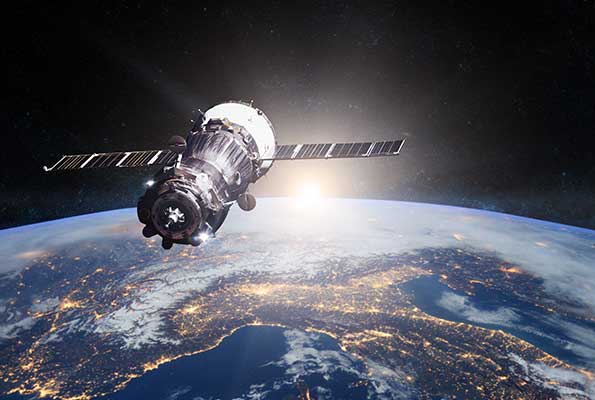The Middle East, a region steeped in history and tradition, is now rapidly emerging as a dynamic player in the global space industry. Long renowned for its vast oil reserves, countries in the Middle East have set their sights on a new frontier, space exploration and satellite technology.
With a vision of transforming their economies and becoming leaders in space endeavours, these nations are working diligently to make the space industry one of the primary growth machines in the region. This article explores how the Middle East is shaping up its space industry and the transformative impact it could have on the region.
A Paradigm Shift
Historically, the Middle East has been dependent on natural resources, especially oil and gas, as the primary drivers of economic growth. However, with the awareness of finite fossil fuel reserves and the need to diversify their economies, governments in the region have redirected their focus toward knowledge-based industries, including the space sector.
Countries like the United Arab Emirates (UAE), Saudi Arabia, and Qatar have launched ambitious space programs, investing substantial resources into research, development, and infrastructure. These initiatives reflect their determination to carve a niche in the highly competitive global space arena.
The MENA countries have recognized the space industry as one of the pillars of their strategic development. These countries have also begun to create ambitious space programs. The primary space industrial advancements in the MENA nations, as well as their alliances and alignments with the major international space powers, are all the subject of expert analyses and insights at this event.
MENA’s Meteoric Rise
In 2014, the UAE Space Agency was established, and since then, the nation has made significant strides in space exploration. The successful launch of the Mars-bound Hope Probe in 2020 marked a historic milestone for the UAE, making it the first Arab nation to reach the Red Planet.
Recently, the UAE’s Hakuto-R Mission 1 spacecraft, carrying the Rashid rover, attempted a lunar landing but crashed during the landing attempt.
Despite the setback, the UAE remains committed to its space ambitions and plans to make a second attempt at a lunar landing led by the Mohammed bin Rashid Space Centre (MBRSC).
Apart from the UAE, nine other countries in the region are having space programs, including Saudi Arabia, which plans to send two astronauts to the International Space Station (ISS).
Furthermore, the UAE’s commitment to fostering local talent has been instrumental in shaping its space industry. Establishing educational programs, scholarships, and partnerships with leading international space agencies has laid a solid foundation for the country’s future space endeavours.
The Dubai Airshow 2023 will take place from November 13–17, emphasizing space technologies. The show’s theme will be space, with the understanding that by 2026, the growing space industry will exceed USD 634 billion. And by 2031, the global space tourism business is expected to be worth USD 12.69 billion.
When Arabsat launched the first Arab satellite in 1985, Saudi Arabia took the lead. Arabsat’s headquarters are in Riyadh, and although it has supported the Arab League, Saudi Arabia is by far the country’s largest shareholder. The first Arab astronaut was Prince Sultan bin Salman Al Saud, the son of the reigning Saudi monarch at the time, King Salman.
By establishing the Saudi Space Commission in 2019, the country signalled its determination to invest in advanced space technologies and infrastructure.
A key aspect of Saudi Arabia’s approach is the emphasis on collaboration with global space entities.
Qatar, though relatively new to the space game, has shown remarkable progress in a short time. The country’s space agency, the Qatar Space Agency (QSA), was established in 2010, and since then, it has taken significant strides in developing satellite technologies and Earth observation capabilities.
Qatar’s investment in space results from its desire to use space-based solutions for various industries. The nation is aiming to enhance its economic diversification and strengthen its position as a regional leader in cutting-edge technologies.
Growth Prospects & Overcoming Challenges
The Middle East’s space industry is also about regional collaboration.
By fostering such cooperation, the Middle East is poised to develop a collective space ecosystem, unlocking growth prospects for the entire region. Collaborative efforts will not only lead to more cost-effective missions but also promote knowledge exchange and skill development, creating a strong regional space workforce.
Investing in the space industry has far-reaching socio-economic implications for the Middle East. As these nations strive to build their space capabilities, they create high-tech job opportunities, attract foreign investment, and stimulate innovation in related industries.
Moreover, the advancement of satellite technologies can bolster critical sectors like agriculture, water management, urban planning, and disaster response. By using space-based data and imagery, Middle-Eastern countries can make informed decisions, enhance resource management, and address environmental challenges.
While the Middle East’s space aspirations are undeniably promising, several challenges must be addressed. These include technological barriers, the need for skilled personnel, funding constraints, and international competition.
To tackle these challenges, governments in the region must continue investing in research and development, promote STEM education, incentivize private sector involvement, and foster international partnerships. Collaboration with established space agencies can prove invaluable in overcoming these hurdles and accelerating progress.
The Final Verdict
By nurturing local talent, fostering regional collaboration, and leveraging international partnerships, the Middle East is well on its way to becoming a formidable player in the global space industry. As these nations reach for the stars, they are rewriting the narrative of the Middle East and transforming it into a pioneering hub of space exploration and technology.



